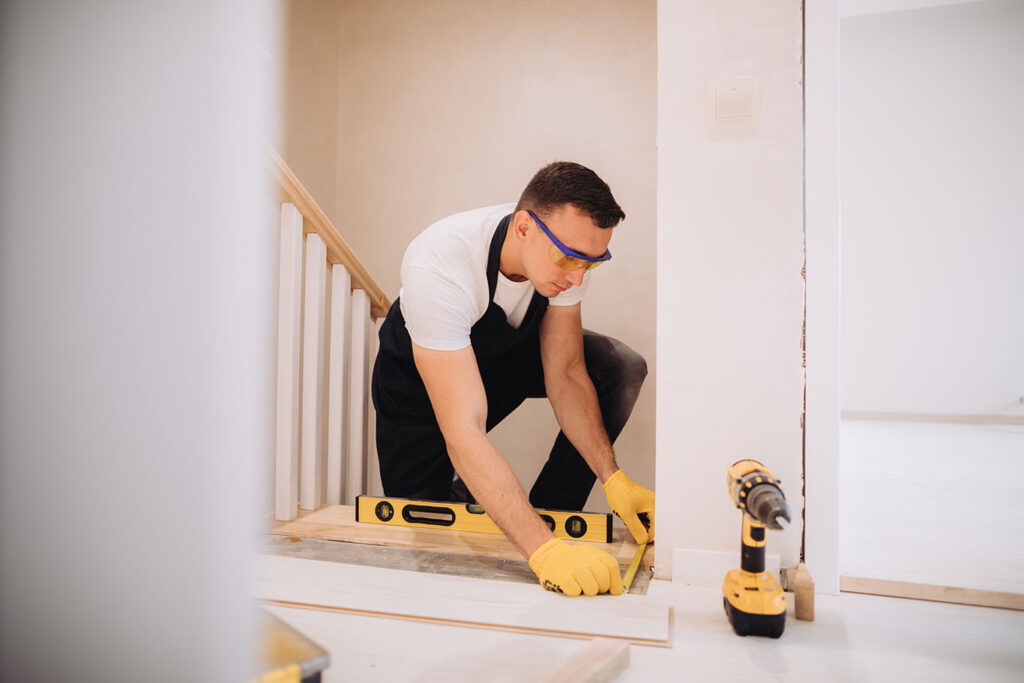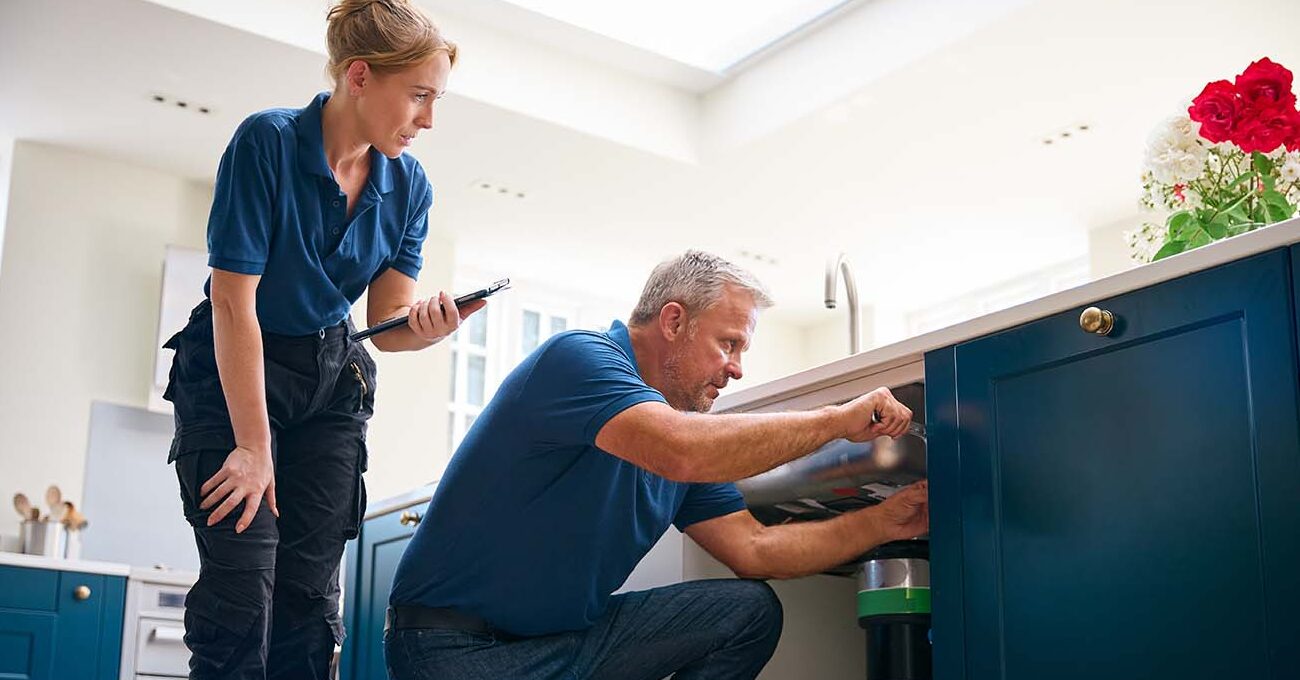Have you ever fixed a leaky tap, hung a shelf, or patched a hole in the wall and thought, “I could do this for a living”? You’re not alone. More and more people are reaching for the toolbox — not just to save money on home repairs, but with an eye on turning DIY know-how into a genuine source of income.
There’s strong and growing demand for people who can handle everyday maintenance and repairs around the home. The good news? Many of these skills can be self-taught, and once you’re confident, there’s real potential to earn from them.
Whether you’re starting from scratch or already have a more specialist trade in mind, learning basic maintenance can be a smart first step. It’s a practical way to build experience, gain confidence, and start attracting customers.
But how realistic is it to teach yourself handyman skills — and more importantly, can you turn those skills into a viable business? Let’s take a closer look.
What are handyman skills?

“Handyman” is a broad term, covering a wide variety of maintenance, repair, and improvement tasks around the home or workplace. These might include:
- Fixing minor plumbing issues (like a dripping tap)
- Replacing light fixtures or switches
- Assembling flat-pack furniture
- Hanging doors or fitting skirting boards
- Painting and decorating
- Minor tiling or plaster repairs
- Installing curtain rails, shelves, or kitchen units
These tasks require a combination of knowledge, patience, the right tools, and a willingness to learn on the job. Many start with small jobs at home and build their skills over time, no formal qualifications required to get started.
Get Handyman Insurance from Protectivity

What handyman work requires qualifications?
While you can legally carry out many tasks as a self-taught handyman, there are certain jobs that require formal qualifications, often for safety or regulatory reasons. These typically include:
- Major plumbing: Anything involving the mains water supply, gas lines, or drainage systems may require a certified plumber.
- Electrical work: Beyond changing a lightbulb or fitting a new socket cover, UK regulations (like Part P of the Building Regulations) require registered electricians for most electrical work.
- Gas appliance work: You must be Gas Safe registered to work on gas boilers, cookers, or heaters.
In short: If it could put someone’s safety at risk, there’s usually a qualification involved.
Is there specific handyman training?
Unlike trades such as electricians or plumbers, general handyman services in the UK don’t require a specific licence to operate. That said, gaining certain certifications can boost your credibility and open doors to more specialised (and better-paid) work.
Some examples include:
- Asbestos awareness certification – Useful if working in older homes
- Construction Skills Certification Scheme (CSCS) card – Often required for work on construction sites
- First aid training – A smart move, especially if working solo
- Health and Safety training – For both your protection and your clients’
Even though these aren’t always legally required, they show professionalism, which helps build client trust.
What handyman work pays well?

Some handyman tasks are more lucrative than others. Here are a few areas where handypeople often earn more, along with typical price ranges:
Bathroom and kitchen repairs or makeovers
Even basic updates like replacing taps or tiling backsplashes can command £150–£600+, while more extensive makeovers may exceed £1,000.
Smart home installations
Installing thermostats, video doorbells, or smart lighting usually brings in £80–£250 per job, depending on complexity and the device brand.
Garden structures
Building sheds, fences, or decking can earn £500–£3,000+, especially for larger or bespoke projects.
Flooring
Laying laminate, vinyl, or tile flooring is typically charged at £15–£40 per square metre, with minimum job rates starting around £200–£300.
Specialist carpentry
Custom shelving, wardrobes, or under-stair storage can fetch £250–£1,500+, depending on the materials and design complexity.
The more complex or specialist the job, the more you can usually charge, particularly if you’re offering a reliable, high-quality service and finish.
How much can you earn as a handyman?
Handyman earnings can vary widely based on experience, location, and service range:
Starting out
New handypeople may charge around £20–£30 per hour, often earning £100–£150 per day while building up reputation and client base.
Experienced handymen
With a steady stream of work and good reviews, rates can increase to £30–£50 per hour, or £200–£300+ per day.
Specialist work
Those offering advanced skills (e.g., tiling, bespoke carpentry, or tech installations) may charge premium rates of £300–£500+ per day, and even more for complex, multi-day projects.
Overall, a busy and well-reviewed handyman can realistically earn £30,000–£50,000+ per year, with top earners bringing in £70,000+, particularly if they take on larger contracts or run a small team.
What’s the difference between a handyman and a contractor?
When people need work done on their homes — whether it’s a quick repair or a full-scale renovation — they’ll usually turn to either a handyman or a contractor, depending on the size, complexity, and legal requirements of the job.
Differentiating can get a bit murky as there’s plenty of cross-over, but generally speaking:
- A handyman is someone who carries out small to medium-sized jobs, usually solo, and often doesn’t need formal licensing. Think “jack of all trades”.
- A contractor usually has formal qualifications, licensing (especially in areas like electrical or gas work), and may manage larger projects involving other tradespeople.
Many handymen eventually move into contracting if they want to take on bigger jobs or hire a team, but there’s nothing wrong with staying solo if that suits your lifestyle and goals.
How to learn DIY and handyman skills
Learning the ropes doesn’t require a classroom. In fact, most handypeople build up their skills over time through a combination of online learning (or YouTube), books, working for other trades and good old-fashioned practice.
Getting started…
- YouTube tutorials – Free, visual, and endless. Channels like See Jane Drill or Ultimate Handyman are great for beginners.
- DIY websites – Family Handyman, Instructables, and DIY Doctor (UK-based) offer step-by-step guides.
- Books and manuals – The Black & Decker Home Improvement series is a DIY classic.
- Evening courses or local workshops – Many adult education centres offer beginner carpentry, plumbing, or decorating classes.
- Practice on your own home – Fix things around the house, then help friends and family. Real-world experience is invaluable.
You can also check out some tips on how to get started as a handyman, here.
Other things to think about
If you’re getting serious about making money from handyman work, there are a few more considerations:
Tools – Buy Smart
You don’t need to buy everything at once. Start with the basics: a good drill, a set of screwdrivers, a spirit level, and a toolbox. Rent or borrow larger tools until you know you’ll use them often.
Insurance
Handyman public liability insurance is a must if you’re working in people’s homes. It protects you in case something goes wrong.
Marketing
Start with word of mouth, but also consider:
- Facebook or local community groups
- Business cards or flyers
- A simple website or Instagram portfolio
- Signing up with platforms like Checkatrade, Rated People or MyBuilder
Portfolio building
Take before-and-after photos of your projects. Document your work and collect client reviews, even for free jobs at the start.
Pricing and time management
Set fair rates, but don’t undervalue your time. Use a job tracker or schedule to stay organised and avoid burnout.
So, can you teach yourself handyman skills?
Absolutely. With the right attitude, some basic tools, and a willingness to keep learning, anyone can develop strong handyman skills. Many professionals start just by fixing things around their own home and slowly build from there.
Whether you’re looking to make a bit of side income or eventually go full-time, self-taught handypeople are thriving, especially those who take their craft seriously, stay safe, and treat clients with professionalism.
The bottom line? You don’t need a trade school to get started. You just need the right mindset and a willingness to get your hands dirty.
Handyman Insurance with Protectivity
Being a handyman comes with certain hazards, as with any trade. Starting a company also has elements of risk, as you navigate finances, build a customer base, try to deliver good work and establish your reputation. Therefore, protecting your business is important if you want to make a success of it.
Protectivity’s Handyman Insurance has been created to help protect your handyman business from typical risks you might face. Our policies include public liability up to £5 million as standard; you then have the option to add Contractor Works cover, Plant and Tools cover, financial loss and employee tools (only if you’ve included the other benefits). You can also insure your tools from as little as £8.98 a month with our new tools insurance offering.
Find out more about our liability insurance for tradesman get an instant quote designed for your needs. If you need any help, our experienced team are on hand to help.
Get Handyman Insurance from Protectivity
*Disclaimer – This blog has been created as general information and should not be taken as advice. Make sure you have the correct level of insurance for your requirements and always review policy documentation. Information is factually accurate at the time of publishing but may have become out of date.
Last updated by

















